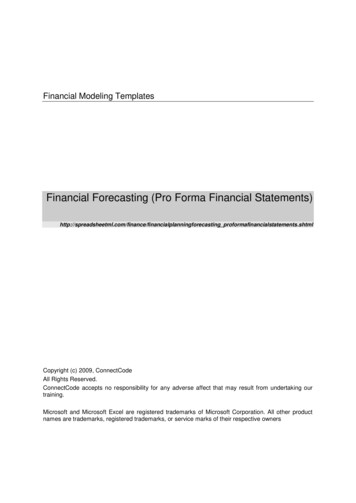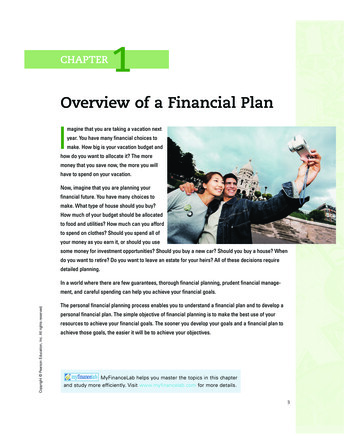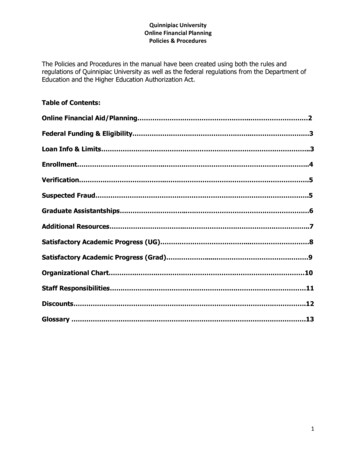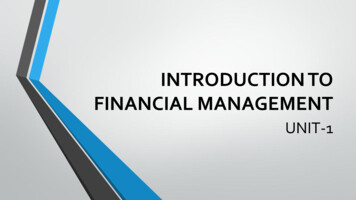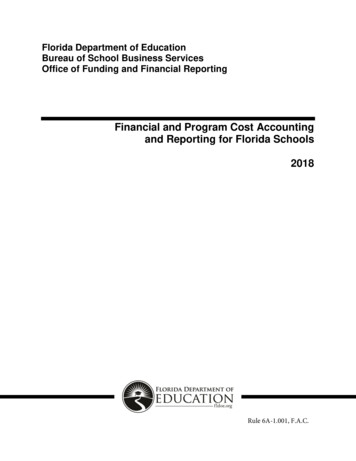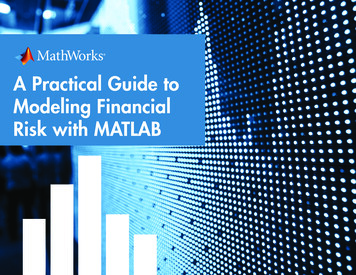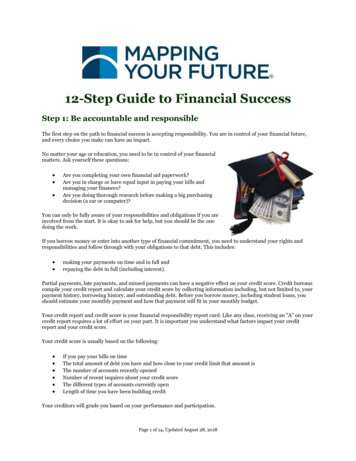
Transcription
How To Make Your FinancialPlan CPA Strong
Why Work With a CPA Financial Planner?Because the person who does your financial planning must also understandthe complexities of your tax situation.The road to financial security is rarely smooth and easy. Creating andfollowing long-term financial and tax planning strategies for your family orsmall business can be daunting, even during stable and prosperous times.In a political, economic and tax environment that is in constant flux, stayingon top of your complex financial life is even more challenging. It’s also moreimportant.Financial planning focuses on a broad range of your individual needs andgoals, and how they shape your decisions on retirement, education, taxes,investing, insurance and your estate.As a trusted advisor, a CPA (Certified Public Accountant) is in a uniqueposition to provide objective recommendations so you can make informeddecisions. CPAs who are also financial planners have the added knowledgein all areas of financial planning – helping you see the big picture andensuring that all of the bases are covered.Being a CPA first and foremost, they are licensed by your state and adhereto a strict professional code of conduct. Along with their additional financialplanning knowledge, this ensures that you can count on competence,objectivity and the highest standard of integrity for your most importantfinancial decisions.Benefiting From the Servicesof a CPA Financial PlannerCPAs have ranked among the most valued and respected professionalsfor more than 125 years, and are second only to physicians in terms ofconsumer trust and confidence. CPA financial planners provide a fullrange of services that can help you attain financial security and success.Although they do not offer every service discussed here, they have theirown specialized combination and will work with other professionals tocomplement those services – customizing their offering to meet your uniqueneeds and specific goals.2
Meeting Your Personal Financial GoalsWhether you’re thinking of purchasing a new home, saving for retirement,Whether you’re thinking of purchasing a new home, saving for retirement,eliminating debt or funding a college education, a CPA can help youeliminating debt or funding a college education, a CPA can help youachieve financial milestones, including:achieve financial milestones with a realistic budget designed around yourresources,responsibilitiesand goals.Your CPA can: Devisepractical savingsand investmentstrategies that help younavigate the complexities of your financial life, capitalize on your Devise practical savings and investment strategies that help youfiscal strengths and address your financial weaknessesstay on budget, capitalize on your fiscal strengths and address Ensure your cash flow is flexible enough to accommodate theyour financial weaknessesgood, the bad and the unexpected in your personal and Ensure that your budget is flexible enough to accommodate theprofessional livesgood, the bad and the unexpected in your personal and Help monitor and revise your financial plan as necessary so you canprofessional livescreate a fluid action plan that meets your goals as well as your lifestyle Help monitor and revise your budget as necessary so you cancreatesavings systemmeets your goals as well as your eTaxeducationPlanningand PreparationAcontinuingrequirementkeeps CPA financial plannersup-to-date about constantly changing tax laws so they can provide prudent,A continuing education requirement keeps CPAs up-to-date aboutyear-round tax planning counsel, including:constantly changing tax laws so they can provide prudent, year-roundtax-managementcounsel. Design strategiesyouYourcan CPAfollowcan:throughout the year to reduce your taxes Clarify the impact of the latest tax laws, legislation and IRS rules Design strategies you can follow throughout the year to reduceon your tax liabilityyour taxes, save money and achieve a smoother tax-preparation Identify the long- and short-term tax consequences of yourprocessspending, investment and other financial decisions, and advise you Clarify the impact of the latest tax laws, legislation and IRS ruleson the steps you can take to reduce your future tax liabilityon your tax liability Identifythe long- and short-term tax consequences of yourEstate Planningspending,investment and other financial decisions, and adviseFor mostof onus,theplanningfor theof ourfinancialyousteps youcandistributiontake to reduceyourfuture resourcestax liabilityand edissue. Counsel you through tax-return issuesHowever,witha CPA financialplanner’sprofessionaland comprehensive Mostimportantly,provideguidanceto help keepthe IRS satisfiedapproach to estate planning, you can be assured that your wishes will beEstate Planninghonored,including:For mostof us,wills,planningforretirementthe distributionof ourfinancialresources Reviewtrusts,plans andotherestate-planningand edissue.documents and ensure that they remain ehensiveapproachtoestate Develop a strategy that fulfills your goals while preserving assetsplanning,assured thatyour wisheswill behonored.foryouthe cannextbegeneration,reducingestate-taxliabilityand providingYour CPAcan:for sufficient liquidity Review wills, trusts, retirement plans and other estate-planningdocuments and ensure that they remain up-to-date Develop a strategy that fulfills your goals while preserving assets,reducing estate-tax liability and providing for sufficient liquidity3
Explain different methods of property transfers, estate-tax rules,the impact of the most current estate-planning legislation andpossible future changes in rules and regulations Collaborate with other team members – attorneys, investmentadvisors, appraisers and insurance brokers, among others – toensure that every issue is properly addressed by the appropriateexpertRetirement PlanningIt is never too late to plan for retirement; however, the sooner planningstarts, the more financially prepared you are likely to feel when the timearrives. Specialized guidance and support from a CPA financial planner canhelp you develop a plan that delivers a secure and comfortable retirementand peace of mind during your pre-retirement years, including: Review expenses that will be, or are likely to be, incurred duringyour retirement and create a plan to eliminate any shortfallbetween income and expenses Identify the primary sources of retirement income that you have orshould have and calculate the savings required for you to retire ata specific age and achieve your desired lifestyle Create strategies for preserving and growing retirement accountbalances and distribution amounts Recommend a diverse range of tax-efficient financial tools – IRAs,401(k)s, investments and tax-sheltered opportunities – that arebest suited to your age and retirement time frameInvestment PlanningInvestment PlanningCreating and growing the resources needed to reach your financialandlifestylestartsa hresourcesneededinvestmentto reach yourfinancialAqualified*planner’sexpert insightprovidesthe foundationandlifestyle CPAgoalsfinancialstarts witha soundinvestmentplan,including:A qualified* CPA’s expert insight provides the foundation on whichyou canbuild a soundinvestmentplan.YourCPAcan: Evaluateyour assets,liabilitiesandcashflow,and determine howyou can bestyourcurrentandfinancialneeds Evaluateyourmeetassets,liabilitiescash flow,and determine howyoucanbestmeetyourcurrentfinancialneeds Explain the advantages and disadvantages of the full range d Explainthe options,advantagesdisadvantagestheandfull rangeofcertificatesdeposit fromto lifeannuities,insurance,Treasurystocks, bondsand insuredmutual fundsinvestmentofoptions,bills andcertificatesof depositto lifeinsurance,stocksand mutualfunds Developa planthat meetsyourshort- andlong-termfinancialgoals, is consistentyourriskshorttoleranceand has thepotential to Developa plan thatwithmeetsyourand long-termfinancialgenerateoptimum returnsduringthe time youto investgoals, is consistentwith yourrisk toleranceand havehas thepotential togeneratestrategiesoptimumforreturnsduringthe timefinancialyou havesetbackto invest Providemanaginga ndprotect Provide strategies for managing a sudden financial setback oryourresourceswindfall, including the best ways to use, manage and protect yourresources* Only professionals who are registered with the SEC or with their state securities regulator toprovide investment advice are eligible to do so. Check with your CPA to be sure he/she is an“investment adviser” under federal and/or state securities regulations.4
Education PlanningYou and your family can look to the future far more positively whenyou have a well-planned strategy for education costs. With a planthat features a CPA financial planner’s tax savvy investment advice andguidance, you can realize your education funding goals and reap thebenefits they deliver, including: Create a timely, diverse college investment strategy designedaround your financial resources, child’s age, risk tolerance andprojected educational costs Explain tax credits and deductions that can defray educationcosts, and the tax implications of education-related investment andsavings decisions Recommend ways for the student to become involved in theplanning process and contribute to the education fund Keep your plan updated to reflect changes in your employmentsituation, investment options, savings plans, financial-aidrequirements and tax laws5
Strategic Business Planning and Consulting Businesshave a differentset of thanneedsthan individualsandBusinessownersownershave a differentset of mall-businessowner’sfamilies. In many cases, however, a small business owner’s personal taxpersonaltax s areintertwinedand aredirectlyconnectedthoseof their business.those oftheir business.CPAs act as advisorsindependentadvisorsCPA financialplannersact as independentwho canwork whowith canworkwith tobusinessownersto help businessthem coordinatebusinessandbusinessownershelp themcoordinateand :goals, including: CreateCreate aa realisticrealistic businessbusiness plan,plan, andand helphelp youyou selectselect izational structure that meets your needs HelpHelp identifyidentify financing,financing, andand negotiatenegotiate financingfinancing termsterms andandconditionsconditions AdviseAdvise onon employeeemployee benefits,benefits, executiveexecutive compensation,compensation, ans, insurance and other areasRisk management PlanningRisk management PlanningRisk is a part of life. It’s how you deal with it that counts. While most of usRisk is a part of life. It’s how you deal with it that counts. While most of usimmediately think of managing risk in terms of insurance, it’s important toimmediately think of managing risk in terms of insurance, it’s important torecognize the need to protect yourself in a full range of areas. This includesrecognize the need to protect yourself in a full range of areas. This includesboth unforeseen events close to home, and the fallout from financial andboth unforeseen events close to home, and the fallout from financial andmarket conditions that might seem far away. Your CPA financial planner can:market conditions that might seem far away. Your CPA financial planner can: Point out areas of your plan that would be most susceptible to risk Point out areas of your plan that would be most susceptible to risk Describe the types of risks in your investment portfolio Describe the types of risks in your investment portfolio Suggest ways to manage risks – avoiding, reducing or sharing Suggest ways to manage risks – avoiding, reducing or sharing Help quantify the impact of loss of income or assets Help quantify the impact of loss of income or assetsThe point isn’t to be afraid; it’s to have a plan in place that offers as muchThe point isn’t to be afraid; it’s to have a plan in place that offers as muchprotection as you need to weather a storm. And who better to talk aboutprotection as you need to weather a storm. And who better to talk aboutrisk in a clear, levelheaded way than an objective CPA financial planner?risk in a clear, levelheaded way than an objective CPA financial planner?6
Meeting With Your CPA Financial PlannerCreating a relationship with your CPA financial planner is similar toestablishing a trusting relationship with other professionals on whom yourely for sound, objective advice, such as a doctor or attorney. You willwant to find a CPA financial planner who can best protect your interests,listen to and address your concerns and, equally important, make you feelcomfortable and valued. It all begins with your first meeting. Here is whatyou can expect: Scope of Services. When you schedule an appointment, he or shewill ask you to explain the type of services you need – your scopeof services, also called an engagement. Examples include taxpreparation, financial planning and investment management. Required Paperwork. Your CPA financial planner will ask that youbring specific records and other documents with you to themeeting. The type of documents will depend on the engagement.Providing the proper paperwork will allow your CPA financialplanner to better understand your situation, and ensure aproductive meeting. Cost of Services. Once you have met and discussed theengagement, your CPA will provide you with an engagement lettersummarizing the services and the scope of work to be performed.It also will discuss the terms of payment depending on the typeof engagement.CPA iswhoa PersonalFinancialis in anidealA CPAA whoalsoisaalsofinancialplanneris in anSpecialistideal positionto understandpositionfinancialto understandyourfinancialposition,speciallyforyour currentposition,andcurrentspeciallytrainedto help andyou preparetrainedhelpyou preparefor theindependentfuture as welladvice– providingthe futureas towell– providingobjective,so you canindependent advice so you can make informedmakeobjective,informed decisions.decisions.Asstartyou thinkingstart thinkingputtingtogetherplanfor familyyour familyAs youaboutaboutputtingtogethera plana foryourorsmall business,thinkturningabout toturningto the whopersonworksmall orbusiness,think aboutthe otalfinancialsituation.Andhelpyouto coordinate your total financial situation. And help you craft a planplan that’s CPA strong.that’scraftCPA aStrong.What are a CPA’squalifications?CPAs’ qualifications make themthe trusted professionals whoare best prepared to meet allof your personal or businessfinancial and tax planningneeds. CPAs must: Hold an undergraduatedegree Complete, generally, up to150 hours of career-focusededucation Pass a comprehensive,rigorous four-section,qualifying examination Meet strict state-licensingguidelines Fulfill generally 40 hoursof continuing professionaleducation each year Adhere by a code ofprofessional ethicsA CPA financial planner buildson this strong foundation withadditional knowledge andexperience making themuniquely to address yourfinancial needs.7
11457B-302Let’s talk about creating a financial plan that’s CPA Strong.Copyright 2011 American Institute of CPAs
arrives. Specialized guidance and support from a CPA financial planner can help you develop a plan that delivers a secure and comfortable retirement and peace of mind during your pre-retirement years, including: Review expenses that will be, or are likely to be, incurred during you



